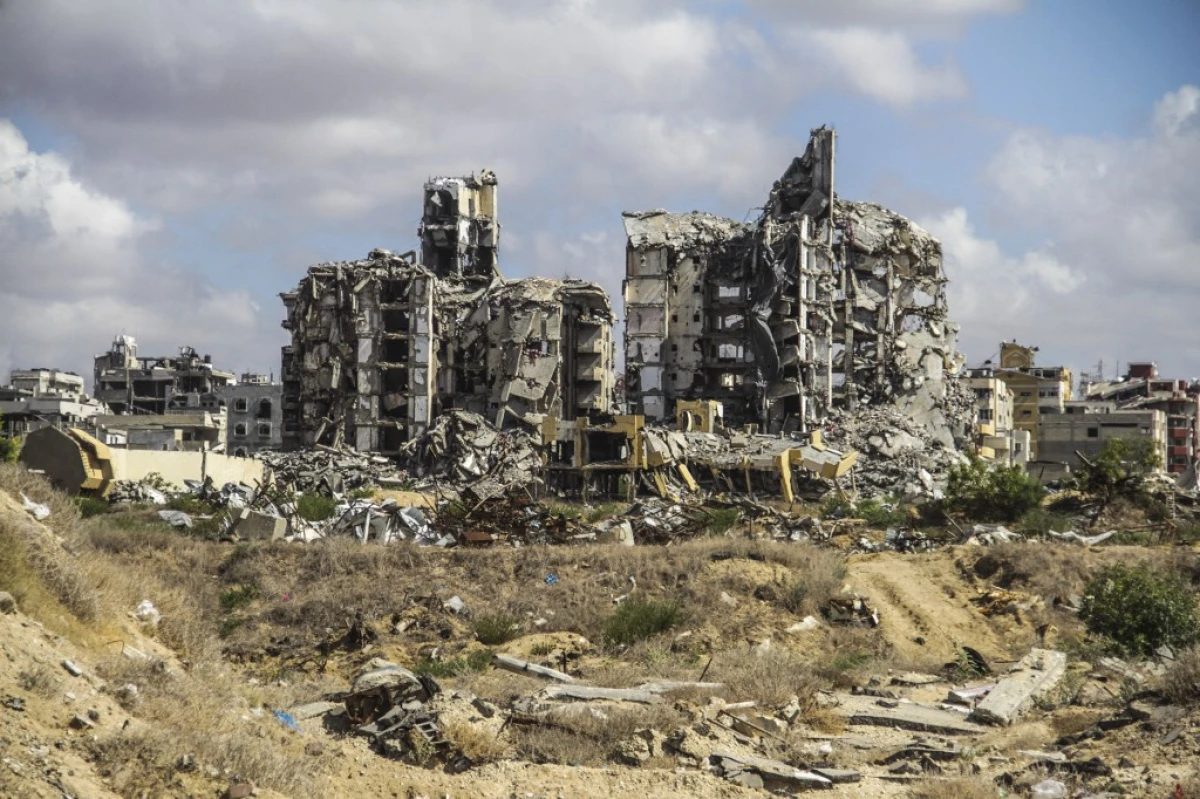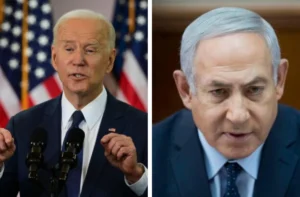
It has been one year since the start of the war between Israel and Hamas. Caracol News Live recounted the most important events that have marked this crude conflict that in the Middle East, instead of ending, continues to escalate and has already reached other borders such as Lebanon or Iran. A team of specialized journalists and analysts reconstructed the key moments of the conflict in the last year, collected the testimonies of the victims, portrayed the dimensions and effects of the war and the new chapters that are opening. You can see the full report in the video that opens this story.
>>> See more: Benjamin Netanyahu assured Emmanuel Macron that Israel will win “with or without your support”
How is the war in the Middle East going?
Israeli Prime Minister Benjamin Netanyahu He vowed Sunday to achieve victory, saying his country’s military has “completely transformed reality” in the year since the Oct. 7 Hamas attack, which left the country fighting two wars.
Netanyahu told his troops that Israel “will win” in its fight against militants in both the Gaza Strip and Lebanon and is preparing to attack Iran, almost a year since the unprecedented attack by Palestinian Hamas militants triggered the Gaza war.
AFP
The head of the Israeli army, Lieutenant General Herzi Halevi, stated that, a year later, “we have defeated the military wing of Hamas.”
Netanyahu had vowed to “crush… and destroy” the militants when fighting began in October last year, but troops have returned to several areas in Gaza where they had previously conducted operations against Hamas, only to find the militants regrouping.
At the end of September, Israel turned its attention to the north, intensifying its military actions against Iran-backed Hezbollah, which had been systematically sending rockets across the border from Lebanon in support of Hamas.
“A year ago we suffered a terrible blow. In the last 12 months we have completely transformed reality,” Netanyahu said during a visit to the border with Lebanon, according to his office.

OMAR AL-QATTAA/AFP
Hamas on Sunday called the October 7 attack “glorious” and said the Palestinians were “writing a new history with their resistance.”
The attack caused the death of 1,205 people, mostly civilians, according to an AFP count based on official Israeli figures that include hostages killed in captivity. Dozens more hostages remain held.
At least 370 people were killed in one place, the Nova festival in the Negev desert, which was commemorated with candles, prayers and music in Tel Aviv on Sunday.
Destroyed, displaced
In northern Gaza, the army said it had surrounded the Jabaliya area after receiving indications that Hamas was rebuilding there despite a year of airstrikes and fighting.
Rescuers said 17 people, including nine children, were killed by Israeli airstrikes in the area on Sunday.
Israel’s military offensive in Gaza has killed at least 41,870 people, most of them civilians, according to figures provided by the Ministry of Health of the Hamas-ruled territory and described as reliable by the UN.
Most of Gaza’s population is displaced and much of the territory’s homes and other infrastructure have been destroyed.
Despite the fighting, which has intensified in Lebanon since late September, and the threat of war with Iran, Netanyahu told French President Emmanuel Macron in a phone call that Israel’s actions in Lebanon would help bring “stability, security and peace to the entire region,” according to Netanyahu’s office.
Lebanese Prime Minister Najib Mikati called on the international community to pressure Israel to declare a ceasefire.
US Vice President and Democratic presidential candidate Kamala Harris He said in a prerecorded interview that Washington was “not going to stop” pressuring Israel and Arab leaders to agree to a truce in Gaza.
The leaders of Jordan and the United Arab Emirates called for intensified international efforts to end both wars. Iraqi Prime Minister Mohammed Shia al-Sudani warned that the fighting could “plunge the region and the world into protracted conflicts.”
Those calls and the efforts of mediators failed to achieve a truce or an agreement on the release of the hostages in Gaza. Netanyahu’s critics accuse him of obstructing that deal.
Israel has been on high alert in the run-up to the October 7 anniversary, which the military says could lead to “attacks on the home front.”

BASHAR TALEB/AFP
Policewoman murdered
At the central bus station in Beersheba, southern Israel, a border police officer was killed and ten other people were injured, saccording to emergency services. Police described the incident as an alleged “terrorist” attack and added that the attacker had also died.
Official Lebanese media reported four Israeli attacks on Hezbollah’s stronghold in southern Beirut on Sunday night, shortly after the Israeli army’s latest calls for residents to leave the area.
The Israeli army stated that it attacked weapons storage facilities and infrastructure while taking measures “to mitigate the risk of harming civilians.”
In a later statement, they said the latest attacks had “hit Hezbollah terrorist targets and weapons storage facilities in Beirut.”
On Sunday night, Lebanon’s Health Ministry said six people were killed and 13 wounded in an Israeli attack on the village of Keyfoun, 20 kilometers from Beirut.
He said Israeli attacks across the country killed 25 people the day before.
Hezbollah said on Sunday it had launched attack drones against a military base near the northern Israeli city of Haifa. He later said he had attacked a second nearby base with a volley of rockets.
The Israeli military said rockets fired from northern Gaza had crossed into Israel, one was intercepted and the rest fell in open areas.
UN peacekeepers accused the Israeli military of compromising their security by operating “immediately adjacent” to one of their positions in southern Lebanon.
UNIFIL previously said it had rejected an Israeli request to relocate some of its peacekeepers.

OMAR AL-QATTAA/AFP
The foreigners flee
Israel, which began ground operations in Lebanon last Monday, says its goal is to allow tens of thousands of Israelis displaced over the past year by Hezbollah’s rocket fire into northern Israel to return to their homes.
Tehran, which supports armed groups across the Middle East, launched around 200 missiles at Israel on Tuesday in revenge for Israeli assassinations of militant leaders, including Hezbollah chief Hassan Nasrallah.
Israeli officials, including Netanyahu, have said Israel will respond to Iran’s missile barrage, most of which were intercepted by the country’s sophisticated air defenses.
Iran has prepared its own plan to respond to a possible Israeli attack, the Tasnim news agency reported, citing an informed source.
Flights at some Iranian airports were suspended on Sunday, Tehran’s aviation body announced, citing “operational restrictions.”
Throughout Lebanon, The attacks have killed more than 1,110 people since September 23, according to an AFP tally based on official figures.
Lebanon’s Director General of Education, Imad Achkar, said on Sunday that 40 percent of Lebanon’s 1.25 million school students had been displaced by Israel’s attacks.

MAHMOUD ISSA/Anadolu via AFP
Several countries have been evacuating their nationals from Lebanon.
Gaza’s Health Ministry reported Sunday that an Israeli attack on a mosque-turned-shelter in central Deir el-Balah killed 26 people. Israel claimed the attack had targeted Hamas militants.
Before the anniversary of October 7, Tens of thousands of protesters marched in cities around the world over the weekend calling for a ceasefire in Gaza and Lebanon.
>>> You may be interested in: In Lebanon, five Israeli bombings are reported in the south of Beirut
Source: https://www.noticiascaracol.com/mundo/noticias-caracol-en-gaza-e-israel-reporte-especial-a-un-ano-de-la-barbarie-cb20


